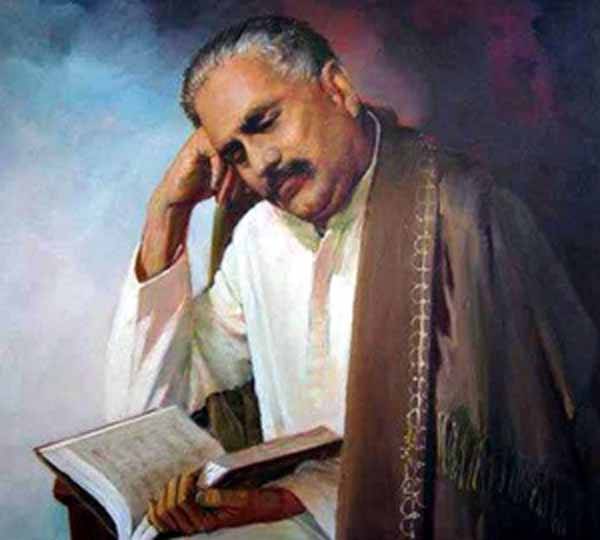Anyone remotely familiar with the poetry of Dr Muhammad Iqbal would know of his multi-pronged flirtations with numerous – often paradoxical – ideologies, at the same time. From fluctuating between a poet and a preacher to being the torchbearer of theocracies and personal faith at the same time – from presenting an anti-capitalist case for theism through Vladimir Lenin in Lenin Khuda Ke Huzoor Mein to his appraisal for sultani, while ostensibly challenging the British Raj – from promoting a Pan-Islamist caliphate-lusting monolithic Muslim world spearheaded by the mard-e-momin (inspired by Friedrich Nietzsche’s übermenschen or superman) to propagating individualism through khudi (inspired by Nietzsche’s der Wille zur Macht or Will to Power) – Iqbal’s writing is brimming with beautifully phrased contradictions. Little wonder that one can find Islamists, secularists, democrats, autocrats, everyone quoting an Iqbal verse to forward – and substantiate – their viewpoint.
Iqbal’s staunch followers argue that these paradoxes are actually exhibits of philosophical evolution that the ‘Poet of the East’ manifested during various stages of his writing career. This assertion, however, doesn’t factor in inconsistencies found during the same epoch of Iqbal’s poetry, and quite often in the same book if not the same poem.
Just like his political and social ideological ‘pluralism’, Iqbal’s religious understanding was an amalgamation of a wide array of centrifugal – and centripetal – interpretations of Islam. A perfect implementation of ideas set in Iqbal’s The Reconstruction of Religious Thought in Islam touted as the ‘Bible of Modern Islam’ would be Tahirul Qadri’s recently launched “anti-ISIS, counterterrorism curriculum” in the UK, which relies on selective readings – and understanding – of Islamic scriptures. It could also be called the ‘Bible of Islam apologia’.
Iqbal’s journey from Sunni Islamism to Sufi Islam, also made a pit-stop at the Ahmadiyya ideology, something that has been heavily debated in the secret chambers of Two Nation Theory enthusiasts. “…in 1897, Sir Muhammad Iqbal took the (Ahmadiyya) pledge,” according to the Daily Nawa-i Waqt, Lahore, 15 November 1953. Ex-General Secretary of the Anjuman Himayat-i Islam, Lahore, Maulvi Ghulam Muhiy-ud-Din Qasoori, confirmed this during the Munir Enquiry. The Munir Report was crucial in sidelining the popular call for excommunication of Ahmadis in Pakistan following the 1953 anti-Ahmadiyya riots. The Munir Report confirmed that “neither Shias nor Sunnis nor Deobandis nor Ahl-i-Hadith nor Barelvis are Muslims, and any change from one view to the other must be accompanied in an Islamic State with the penalty of death, if the Government of the State is in the hands of the party which considers the other party to be kafirs.”
While Maulvi Ghulam Muhiy-ud-Din Qasoori’s assertion of Iqbal’s allegiance to the Ahmadiyya ideology proved to be pivotal in overcoming calls for judicial takfir, it was the same Iqbal whose essay The Muslim attitude towards the Ahmadiyya movement (1935) presenting the case for declaring ‘Qadianis’ a separate community, which was cited in the lead-up to the Second Amendment in 1974 to ‘officially’ excommunicate the Ahmadis.
Iqbal had written: “The best course for the rulers of India is, in my opinion, to declare the Qadianis a separate community. This will be perfectly consistent with the policy of the Qadianis themselves, and the Indian Muslim will tolerate them just as he tolerates other religions.”
Whether Iqbal’s regression from labelling Ahmadiyya community “a true model of Islamic life” – as he had asserted in an Aligarh session – to their identification as a separate community altogether, was a corollary of Islamist pressure, or a result of theological self-reflection only he would’ve known best. For, only in 1931 Iqbal had played an instrumental role in the selection of Ahmadi leader Basheer-ud-Din Mahmood Ahmad as president of the All India Kashmir Committee.
The 1930s saw an upsurge in anti-Ahmadiyya protests among the Muslim community, with Jinnah being condemned as an infidel for his visits to the ‘Fazl Mosque’ in London, which was affiliated with the Ahmadiyya community. It was Maulana Abdur Rahmin Dard, the Ahmadiyya Imam who persuaded Jinnah to return to India and it was inside the ‘Fazl Mosque’ that he announced his decision to return. Jinnah staunchly defended the Ahmadis’ right to self-identify as Muslims, and stood by Sir Zafarullah Khan – Pakistan’s first foreign minister – whenever his religious identity was attacked to discredit his political acumen.
According to multiple literary sources, Iqbal regularly visited Qadian following his conversion to the Ahmadiyya ideology in 1897. When the founder of the ideology – who Iqbal had praised as “probably the profoundest theologian among modern Indian Muslims” in a paper written in 1900 – visited Sialkot in 1904 Iqbal, along with his friend Sir Fazli Husain, was in audience with him. While many believe that Iqbal formally left the Ahmadiyya ideology in 1908, his correspondence with the Ahmadi khalifas continued in the coming years. Before 1935 Iqbal had never exhibited any condemnation of, nay disagreement with, the Ahmadi ideology.
Iqbal’s parents are believed to have converted to the Ahmadiyya ideology, along with his elder brother Shaikh Ata Muhammad, which might have influenced his early affiliation with the ideology. Even though narrators suggest that Iqbal himself was inspired by the ‘reformist movement’ as he exhibited in his writings and recorded exchanges with many Ahmadi leaders during his lifetime.
Iqbal’s affiliation with the Ahmadiyya ideology is used by Islamists to discredit his work; and by his staunch followers as an exhibit of his ‘spiritual pluralism’. The actual remnants of the affiliation unfortunately self-manifests in the anti-Ahmadiyya bigotry that prevails in Pakistan – the country whose ideological founding father – and his blood relatives – were once affiliated with the Ahmadiyya ideology.
Iqbal’s critics have long debated over self-defeatism in his writings. With the same man being cited to maintain the faithfulness and infidelity of the same community, in 1953 and 1974 respectively, Pakistani Ahmadis are the most unfortunate emblem of Iqbal’s paradoxes.






